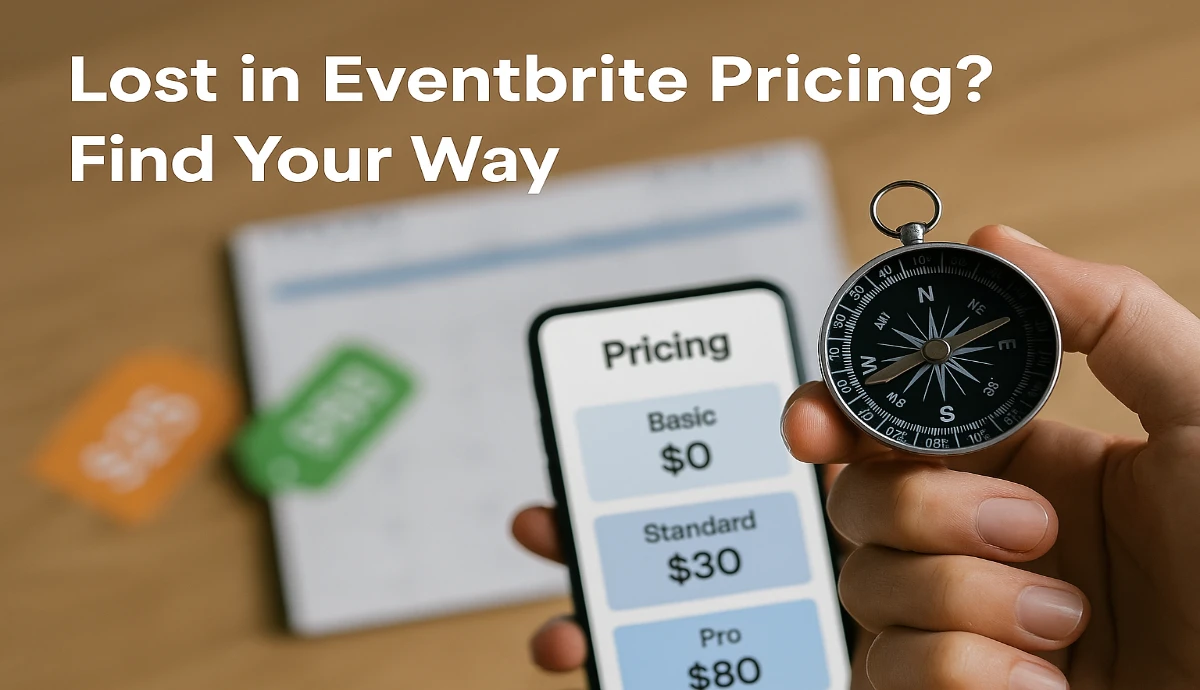Ticketing is one of the many complex aspects of event planning.
Conventional ticketing techniques are prone to mistakes and often very difficult. Online ticket management, on the other hand, can save you a lot of time.
More importantly, having a ticket management platform also makes you less vulnerable to fraud.
In this article, you will learn more about online ticket management, the right tools, and how to use them.
Scroll till the end for a free trial.
A. What is online ticket management?
Online ticket management refers to the process of producing, marketing, distributing, and confirming event tickets.
This is done remotely, often using online ticket management platforms.
Online ticket management is the biggest event planning trend for a reason.
It streamlines the purchasing process for attendees, automates ticketing, and tracks sales in real-time.
B. Why do you need only ticket management for events?
An online ticket management system can make your life easier in so many ways. Here are a few:
1. Streamlined operations
By automating ticket distribution and sales, planners are left with a lot more time. They can now concentrate on other important event-related tasks.
2. Enhanced security
The possibility of counterfeit tickets is reduced when digital tickets are embedded with unique QR Codes.
3. Better experience for attendees
Online platforms provide benefits that offline ticketing never did. These include mobile ticketing, immediate confirmations, and simple access to event details.
4. Real-time analytics
Online ticket management gives you access to current sales data and attendee demographics. This helps you make better targeted marketing campaigns and well-informed decisions.
5. Increased reach
By integrating with email campaigns and social media, online ticketing platforms can increase promotional efforts and reach a larger audience.
6. Flexible payment options
By providing a variety of payment gateways, the purchasing process is made simpler. With this, you can also accommodate a wide range of attendee preferences.

C. What should you look for in an online ticket management system?
Choosing the right online ticket management system can make or break your event experience. A seamless, efficient system not only simplifies ticket sales but also enhances attendee engagement. Here are the must-have features to consider:
1. Customizable ticket design
Your event tickets should reflect your brand. A good ticketing platform allows you to personalize ticket layouts, colors, logos, and fonts, ensuring a professional and cohesive brand identity.
2. Secure QR Codes
Security is paramount. Look for a system that generates unique, scannable QR codes or barcodes on each ticket. These codes help prevent fraud, speed up entry with quick scans, and provide real-time check-in data.
If your ticketing platform integrates custom apps or payment gateways, consider a free application vulnerability assessment to identify code, pipeline, and runtime risks that could enable fraud or data exposure.
3. Multiple payment options
Make it easy for attendees to pay by offering multiple payment methods. A reliable system should support credit/debit cards, digital wallets like Apple Pay and Google Pay, and bank transfers. The more flexible the options, the higher the chances of converting potential buyers.
4. Instant ticket delivery
Attendees appreciate instant gratification. Your system should automatically send digital tickets via email or SMS immediately after purchase, reducing manual efforts and ensuring a hassle-free experience.
5. Mobile compatibility
With most ticket purchases happening on mobile devices, ensure the platform is mobile-friendly. This includes an easy-to-navigate website and mobile-optimized tickets that can be scanned directly from a smartphone screen.
6. Event check-in management
Smooth entry management is crucial for large events. Opt for a platform that offers check-in tools or mobile apps to scan tickets efficiently, track attendance in real time, and reduce long queues at the entrance.
7. Data and analytics
A strong reporting system can provide insights into ticket sales, revenue, attendee demographics, and engagement trends. These analytics help in making informed marketing decisions and improving future events.
8. Integrations with event platforms
A powerful ticketing system should seamlessly integrate with event management tools, CRM platforms, email marketing software, and social media. This allows for automated workflows, better audience targeting, and enhanced promotional efforts.
D. Comparing top online ticket management tools
Selecting the best ticketing platform is a key to make your event a success.
The right tool should simplify ticket sales, enhance the attendee experience, and fit your budget.
Below, we have compared three popular platforms—Ticket Generator, Eventbrite, and Eventtia. This will help you make an informed choice.
1. Ticket Generator
Ticket Generator is a simple, secure, and cost-effective platform designed for event planners.
It’s best for those who prioritize ticket creation without needing extensive event management tools.
It focuses on QR Code-based tickets that prevent fraud and enable seamless check-ins.

Key features:
- Secure QR codes: Each ticket has a unique QR code to eliminate duplication and ensure smooth entry
- Customizable ticket designs: Modify ticket layouts to match your event branding
- Pay-per-ticket pricing: A budget-friendly model where you only pay for the tickets you generate—ideal for varying event sizes
- Instant ticket delivery: Tickets are automatically sent via email or SMS, reducing manual distribution efforts
Pros:
- Extremely user-friendly with a minimal learning curve
- Affordable pricing, making it a great option for small to medium-sized events
- High security with built-in QR Code authentication
Cons:
- Lacks advanced event management features such as attendee engagement tools and scheduling
Best suited for: Event organizers who need a secure and budget-friendly ticketing solution without complex event management features.
2. Eventbrite
Eventbrite is one of the most well-known ticketing platforms. It offers a comprehensive suite of tools for event creation, ticket sales, and attendee management. It’s designed for everything from small workshops to large-scale conferences.

Key features:
- Event creation and promotion: Build event pages, send email invites, and promote events on social media
- Multiple ticket types: Supports early bird pricing, VIP packages, and group discounts
- Integrated payment processing: Accepts various payment methods and multiple currencies
- Analytics & reporting: Provides insights into ticket sales, revenue trends, and attendee demographics
- Mobile app: The Eventbrite Organizer app allows event management and real-time check-ins
Pros:
- Comprehensive event management features with built-in promotional tools
- Seamless integration with social media and marketing platforms
- Detailed analytics to track event performance and improve future planning
Cons:
- Higher service fees, especially for large events
- Steep learning curve due to the platform’s extensive features
Best suited for: Event planners managing medium to large-scale events that require ticketing, promotion, and in-depth analytics.
3. Eventtia
Eventtia is a feature-rich event management platform built for corporate events, conferences, and hybrid gatherings.
It goes beyond ticketing, offering networking tools, virtual event capabilities, and scheduling options.

Key features:
- Event website builder: Create professional event websites with no coding required
- Advanced registration management: Customize registration forms, categorize attendees, and send automated confirmations
- Virtual event capabilities: Host webinars, virtual booths, and networking sessions in addition to in-person events
- Agenda management: Design and manage event schedules, including multi-session programs and workshops
- Attendee networking: Enable participant interactions through AI-powered matchmaking and meeting scheduling
Pros:
- Highly customizable for corporate events and conferences
- Strong focus on attendee engagement and networking opportunities
- Supports both physical and virtual events, making it flexible for hybrid gatherings
Cons:
- Subscription-based pricing can be expensive for smaller events
- Steep learning curve due to its extensive features
Best suited for: Corporate event planners handling large-scale events. This includes conferences, trade shows, or hybrid events that need advanced attendee engagement and scheduling tools.
E. Choosing the best online ticket management tool
We know the last section was a bit complicated if you’re not used to reading long analyses.
So, here’s a simpler version that will help you choose the best online ticket management tool for your event:
F. Tips for successfully using an online ticket management tool
To make the most of your online ticket management system, follow these key strategies:
- Use early bird pricing–Offer discounted rates for early buyers to drive ticket sales by creating urgency
- Promote your event effectively—Leverage social media, email marketing, and partnerships
- Ensure a smooth check-in process–Use QR-Code scanning or contactless entry systems to reduce wait time
- Analyze post-event data–Review ticket sales, attendee demographics, and feedback to improve future events
Try out these new tips on Ticket Generator. The first ten tickets are on us!
G. FAQ
1. How do I prevent ticket fraud?
Ticket fraud is a major concern for event organizers. However, you can minimize risks by implementing QR Codes and real-time verification systems at entry points.
Unique, scannable codes prevent duplication and ensure only valid ticket holders gain access.
2. Is mobile ticketing better than printed tickets?
Yes, mobile tickets offer several advantages over printed ones:
- Eco-friendly–They reduce paper waste and support sustainability
- Cost-effective–Digital tickets save printing costs and manual distribution efforts
- More secure—They’re harder to duplicate, especially when paired with QR Code authentication








.gif)






